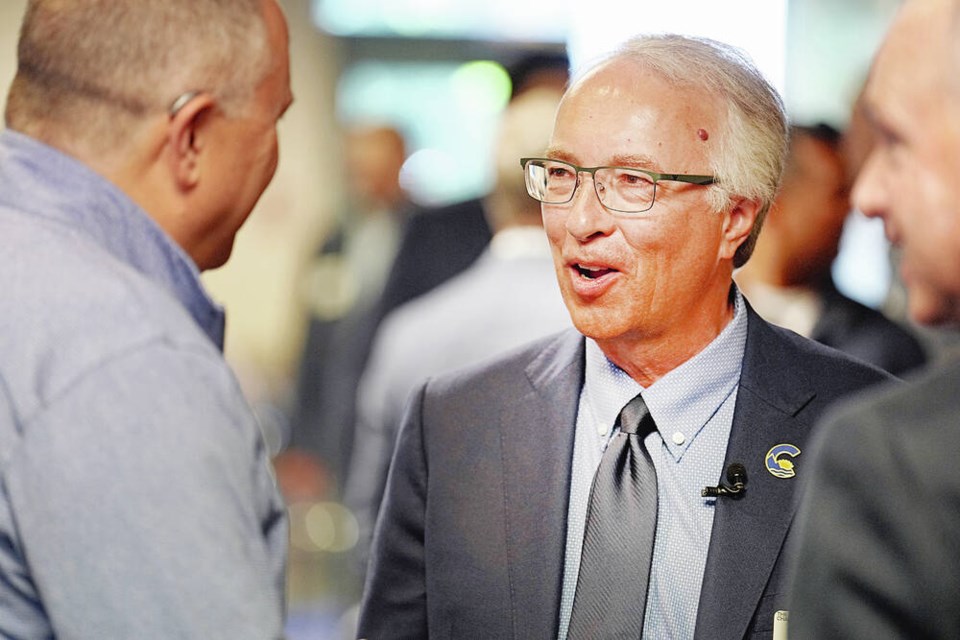Fresh off another successful poaching foray, Conservative Party of B.C. Leader John Rustad described himself to the Greater Victoria Chamber of Commerce on Wednesday using the loaded phrase “common sense.”
It’s become politically freighted since federal Conservative Leader Pierre Poilievre started using it to some effect. Rustad wasn’t shy about borrowing it.
His common sense vision for public safety involves a big increase in addiction treatment programs, most of them private and some of them involuntary, meaning during incarceration. He wants indefinite apprehension of permanently brain-damaged habitual offenders now wandering the streets, on mental health grounds. That could involve invoking the notwithstanding clause in the charter of rights to bypass constitutional concerns if need be, he said.
On the economic side, Rustad wants significant income tax cuts — to be detailed later — and eradication of red tape that stifles everything from logging to recruitment of health workers.
He also wants to start a conversation on nuclear power, given that the wholesale electrification to get off oil is going to vastly outstrip generating capacity. If everyone switched to heat pumps, per the NDP’s urging, B.C. would need six more Site C dams to keep up, he said.
Several Conservative candidates accompanied him to the luncheon, most notably Chris Moore, who up until 90 minutes before the speech was the BC United candidate in Powell River-Sunshine Coast.
Moore and most of his key local supporters bolted BC United and signed on with Rustad’s team, citing dissatisfaction with how the party is running the campaign.
The defections of previous BC United MLAs Bruce Banman, Lorne Doerkson and Elenore Sturko have created a feedback loop that makes every subsequent one that much easier.
Apart from all the other problems with the rebranding of the former B.C. Liberals, the new United name is simply not accurate anymore.
Moore said BC United Leader Kevin Falcon took it graciously when he broke the news to him. If so, it’s because he’s getting so used to it.
The defections are a key part of how Conservatives supplanted BC United in the polls to the point where what’s left of the official opposition is now considered to be splitting the Conservative vote, not the other way around.
But there is still room for some kind of make-up, depending on how the October vote breaks down.
Rustad said if Conservatives and BC United together get more seats than the NDP, he would reach out to United to join them in bringing down the NDP as soon as possible on a confidence vote. That would lead to a minority government arrangement.
“I hope I don’t offend people, but [Premier David Eby] is a socialist. He believes very strongly in big government. … He’s also an authoritarian who does not respect democracy and local governance.”
Eby labelled Rustad “a threat to democracy” in the legislature last fall, so the one thing they have in common is an appreciation of how dangerous each other is.
Rustad reiterated the Conservative stance that provincial health officer Dr. Bonnie Henry will be fired if they are elected. The declaration was initially based on the vaccination mandate for all health workers, which Rustad said is ideologically based and has cost some professionals their jobs. It’s also now based on her continued support for safe supply and decriminalization of addictive drugs, he said.
“That is not the approach that we want to take… and so it’s not a fit for what we are thinking.”
He threw two more radical ideas into the mix while introducing himself to the business audience. He’s prepared to work on making immigration policy a provincial responsibility, as it is in Quebec, to cope with chronic labour shortages in key areas.
He’d look at private health care to cut the number of fatalities on medical wait lists, which he said is in the range of opioid overdoses.
“We need to look at unleashing the potential of a little bit of competition.”
Hospitals now cut services to meet their budget because they look at patients as a cost, he said. “We actually need to reverse that, we need to look at patients as revenue generators.”
A different funding model would encourage more procedures to make up shortfalls, not less, he said.
>>> To comment on this article, write a letter to the editor: [email protected]




